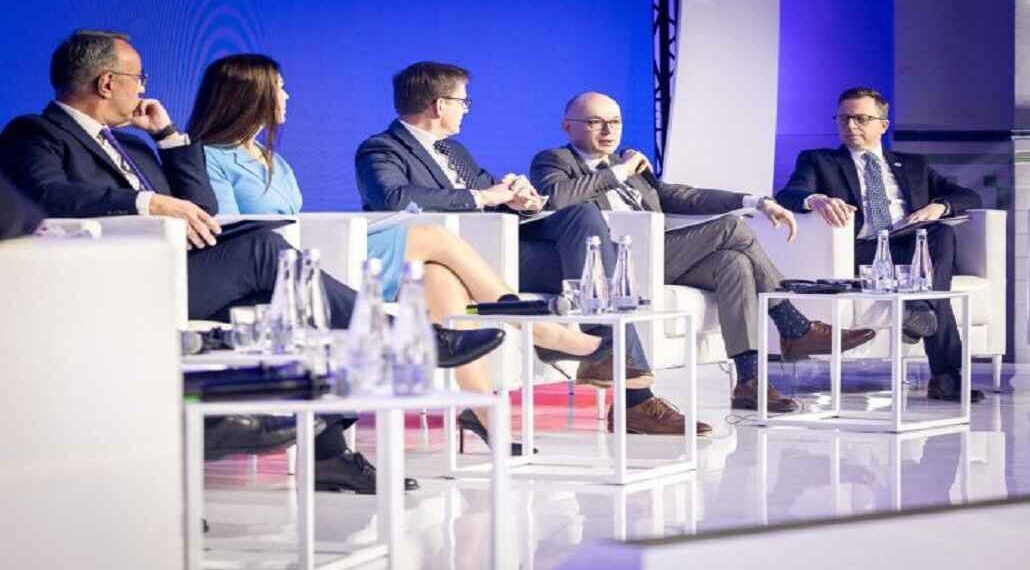Minister Sabutis: Lithuania seeks more long-term EU financial support for key transport projects
At an international conference in Łódź, Poland, Eugenijus Sabutis, Lithuania’s Minister of Transport and Communications, highlighted the need for the European Union (EU) to provide long-term funding for strategic transport infrastructure projects in Lithuania and the Baltic region. The Lithuanian Ministry of Transport and Communications reported this development following Sabutis’s remarks on February 13th.
“Last week we witnessed a historic event – the Baltic States synchronised their electricity grids with continental Europe, thus consolidating their energy independence. The next step must be to connect us to the European transport networks. To achieve this goal, however, much larger, more precise, and long-term investments are required. Therefore, together with the transport ministers of other countries, we want to put emphasis to the European Commission that the growing importance of this sector must also lead to a different approach to funding. It must be planned decades ahead,” said Sabutis, Lithuanian Minister of Transport and Communications.
Long-Term Support for Rail Baltica and Via Baltica
Minister Sabutis emphasized the importance of stable EU funding beyond 2028 for projects like Via Baltica and Rail Baltica, which are critical for enhancing the efficiency of the European transport system and strengthening connectivity with Poland and Central Europe. Lithuania is committed to developing the north-south Trans-European Transport Network (TEN-T), linking the Baltic, Black, and Aegean Seas with transport corridors that have sufficient capacity for both civilian and military needs.
To date, Lithuania has secured over €125 million in EU funding for military mobility links. These funds are allocated for projects such as sections of the Via Baltica route to the Polish border, Kaunas Airport, and other major infrastructure upgrades. However, Lithuania estimates an additional €3.5 billion is required to meet its military mobility needs.
A total of €1.69 billion was allocated by the EU from 2021 to 2023 to improve military mobility across Europe. Sabutis reiterated that additional funding would not only benefit Lithuania but also enhance the transport system’s overall efficiency across the continent.
Progress on Rail Baltica and Via Baltica
Construction on the Rail Baltica main line is well underway, with engineering works progressing along the Kaunas to Panevėžys section. By the end of this year, construction will cover 114 km of the 265 km section, completing 43% of the railway line’s first phase. The entire Rail Baltica project is set for completion by 2030.
On the Via Baltica route, three of the four sections of the 40 km stretch from Marijampolė to Poland have been completed, with 28.5 km fully modernized. The final section is scheduled for completion this year, while design work continues for the segment from Kaunas to Latvia’s border.
New Military Mobility Links
The TEN-T network is being enhanced with new connections such as a European railway line to Klaipėda and military mobility links from Białystok via Augustów, Lazdijai, and Alytus to Vilnius. Lithuania and Poland have submitted a joint application to the European Commission for funding to adapt the Augustów–Vilnius route for military mobility needs.
During Minister Sabutis’s working visit to Warsaw in January this year, the Lithuanian and Polish Transport Ministers have agreed and jointly applied to the European Commission for European funding to adapt the Augustów–Vilnius route to military mobility needs.
Strategic Importance of EU Support
Sabutis emphasized the strategic importance of EU investments in transport infrastructure for Lithuania and the Baltic region. These projects are critical for improving road and military mobility, as well as enhancing regional and European connectivity.
The Minister concluded by urging the EU to adopt a forward-looking approach, stating that securing stable and adequate funding for transport infrastructure beyond 2028 would not only strengthen Lithuania’s position in the European transport network but also contribute to the EU’s broader goals of sustainability, security, and efficiency.


































